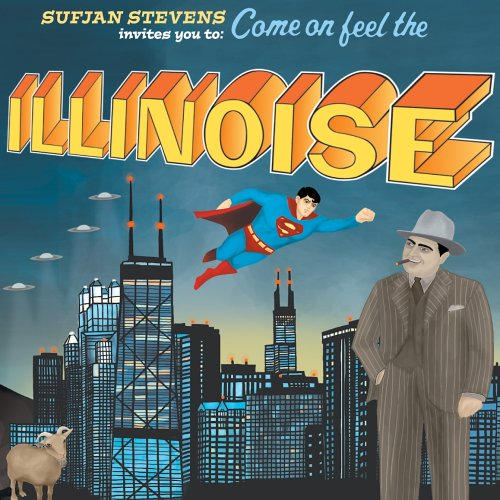Classic Review 7/29/15: Sufjan Stevens – ‘Illinois’
Unraveling a nostalgic, beautiful indie opus

Fair use image from Asthmatic Kitty Records
One of several different covers released for Illinois. The central image of Superman has been replaced by balloons or simply left blank on later releases of the album.
At no point in his fifteen-year career has Sufjan Stevens been content to stay in any particular genre. The 40-year old multi-instrumentalist has made it his mission statement to defy classification, and on no album is this made more apparent than on his 2005 LP, Sufjan Stevens Invites You to Come on Feel the Illinoise, or simply Illinois.
A quasi-conceptual album, Illinois weaves a series of unrelated tales centered in or concerning the state of Illinois, telling the story of the region in a way that is entirely unique and wholly refreshing even a decade on after its release.
Over the years, Stevens has made indie rock (2003’s Michigan), electronic pop (2010’s The Age of Adz), and tender folk (2015’s Carrie and Lowell), but on Illinois it all comes to a head. Sweeping orchestral arrangements merge effortlessly with the sonic mishmash that characterizes classic Sufjan. His lithe, ghostly whisper of a voice recalls a quieter, more reflective Elliot Smith, and lyrically, he touches on everything from serial killers, to Superman, to alien abductions, all with a sensible, introspective flair, and an endearing, almost childlike, sense of wonder and naivety.
Illinoise is a long album – a good chunk of its 22 tracks cross the six minute mark – but it is just as dense as it is lengthy. Every second of the record has so much going on that only on multiple listens can it truly be appreciated as a whole. The impeccable, almost symphonic layering of baroque pop instrumentals and simple, heartfelt vocals recalls Brian Wilson at his peak, and the subtlety – both in the arrangements and the lyrics – is unlike anything else since those heady days.
To truly look past the broad strokes of what makes Illinois stand out would take far more than a simple review, but the album’s one-two punch middle section – the nostalgic roadtrip odyssey “Chicago” and the heartbreaking folk lament “Casimir Pulaski Day” – can be seen as its thematic centerpiece.
“Chicago” is symphonic Sufjan at his absolute best; a Phil Spector-esque “wall of sound” of drums, strings, and backing vocals accompanies Stevens as he looks back on a cross-country trip he took with a friend of his. He reflects on the van they rode in, the parking lots they slept in, and the tears of joy they cried for the freedom of it all. It’s a touching song, and his delivery adds an underlying touch of sadness to the bright, orchestral instrumental.
That’s all the backstory we get, and it’s all we need. Looking through Sufjan’s rose-tinted glasses presents us all with a similar connection: we all, in some way or another, pine for the same perfect, unattainable past. His rumination on days gone by becomes ours, and by the final soaring chorus, Sufjan’s bittersweet nostalgia reflects our own.
As “Chicago” fades out in a wash of vocal loops and harmonics, there is scarcely time to reflect before the man himself reappears, counting in the single guitar that makes up the instrumental for the next track, “Casimir Pulaski Day.” So named for the Illinois state holiday celebrating the eponymous Revolutionary War hero, Sufjan tells a story of that date – perhaps anachronistically – the day a girlfriend of his youth died of bone cancer.
A core part of much of Sufjan’s songwriting is his strong, devout Christian faith. That’s not to say he belts out Creed-esque ballads about Christ; religion is more of an underlying inspiration in his music than an overt muse. On “Casimir Pulaski Day,” he looks back on the trying time in his life when that faith was called into question, watching a loved one wither away while praying over her, “but nothing ever happens.” It’s a visceral, depressing track, accompanied by a lone, sparse guitar.
When following the sweeping “Chicago,” “Casimir Pulaski Day” just becomes that much more hollowing and effective. Sufjan’s ability to mix the hopeful with the tragic is played to great effect on Illinois; somber tracks like the funeral march-like “The Seer’s Tower” are juxtaposed with upbeat, poppy numbers like “The Man of Metropolis Steals our Hearts,” a look at the mythos of Superman and how he represents a perfect ideal for us as a people to strive for – all based solely on the town of Metropolis, Illinois. It’s a reach, to be sure – more than a few tracks on this album have little to do with the titular state – but in the end, it doesn’t matter.
Sufjan Stevens weaves a new geography and a new mythology to match it over Illinois‘s 70-odd minutes. Few albums of this or any decade can blend genres, themes, and subject matter so deftly and so enjoyably. Its status as a classic ten years later is unquestionable, and those listening to it for the first time are in for something unlike anything else in the current musical sphere.
10/10


